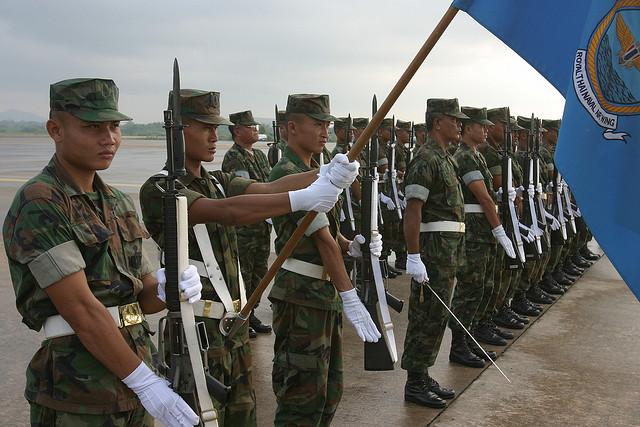 Still reporting from Washington DC, this week’s ‘Suggests’ is jam-packed with links, reports, podcasts and videos on strategy, security and defence.
Still reporting from Washington DC, this week’s ‘Suggests’ is jam-packed with links, reports, podcasts and videos on strategy, security and defence.
I’m kicking off today with a general shout-out for a handful of stellar American defence blogs and sites you should be following: DefenseOne, The Bridge, War on the Rocks, CIMSEC’s Next War, RealClearDefense, Blogs of War, CogitASIA, The National Interest, Small Wars Journal and, of course, the Duffel Blog.
Turning now to our immediate region, a spokesperson for the Defence Minister announced on Monday that Australia would suspend two activities with the Royal Thai Armed Forces in response to the recent military coup. On 22 May, Secretary of State John Kerry announced that the US was reviewing cooperation with the Thai military, in accordance with US law. A few days later, the US suspended $3.5m in military assistance and cancelled military exercise Cooperation Afloat Readiness and Training (CARAT) 2014 as well as a planned visit by US Pacific Fleet commander Admiral Harry B. Harris to the country.
Sticking with Thailand, occasional Strategist contributor Geoff Wade explains in a new Parliamentary Library blog post that the US maintained as many links as allowed under American legislation with the Thai military after the 2006 coup in order to curb Beijing’s influence. In his opinion, this is one of the US administration’s concerns with the current coup. Wade also notes that uneasy ties between Bangkok and Phnom Penh might impact upon Australia’s plans to relocate asylum seekers in Cambodia.
In case you missed it, here’s the full text of President Obama’s West Point speech, articulating his foreign policy vision for the remainder of his term. Highlights include his pronouncement that the most direct threat to America’s security is terrorism (and therefore proposed a counterterrorism fund of up to $5bn), the importance of international institutions and American leadership, and the need for partners and friends to do more. CSIS’ Ernie Bower has a brief piece on how the West Point speech was heard in Southeast Asia.
What do closer US–China ties mean for Japan? In light of Prime Minister Abe’s controversial visit to the Yasukuni shrine, the Tokyo Foundation’s Takashi Sekiyama argues the Japanese leader needs to adopt ‘smart diplomacy’, as:
Tokyo’s current course is a dangerous one. At a time when not only Washington but also the vast majority of European and Asian governments are keen to maintain stable ties with Beijing, Japan risks isolating itself by needlessly antagonizing the Chinese and then seeking validation from the international community.
The Bridge and CIMSEC are currently co-hosting a series of essays in which national security professionals were asked to provide their theory of power and its application (check out Rich Ganske’s intro essay here). The series covers the following domains: cognitive by Lieutenant Colonel Dave Lyle (USAF), defence industry by Mikhail Grinberg, joint action by Rich Ganske, cyber power by Billy Pope, social choice by Adam Elkus, land power by Nathan Finney (aka The Barefoot Strategist), sea power by Benjamin Armstrong, and amphibious power by Brett Friedman. (Update 31 May: new entries include ‘A personal theory of strategy’ by Nick Prime and space power by Nathan Finney)
And on a lighter note, in case you were ever wondering, here’s everything you needed to know about the Pentagon’s plan for a zombie apocalypse via Foreign Affairs.
Podcast
ASPI analyst Hayley Channer is also currently in DC as a visiting scholar at the East-West Center. She recently recorded a podcast for the Korea Economic Institute (KEIA) on the Australia–South Korea relationship as well as the recent trips by Prime Minister Abbott and President Obama to Northeast Asia.
Video
This week’s video pick comes courtesy of Strategist editor Kristy Bryden. Sebasian Junger, who is well known for authoring the book War as well as co-directing the film ‘Restrepo’, has a new TED talk on why veterans miss war.
On the Obama Asia Pacific strategy, here’s the video of a CSIS-hosted event (audio as well) on the challenges and opportunities of the US Navy’s rebalance, featuring Chief of Naval Operations, Admiral Jonathan Greenert.
Natalie Sambhi is an analyst at ASPI and editor of The Strategist, and currently a visiting fellow at the Center for a New American Security. Image courtesy of Flickr user US Department of Defense.